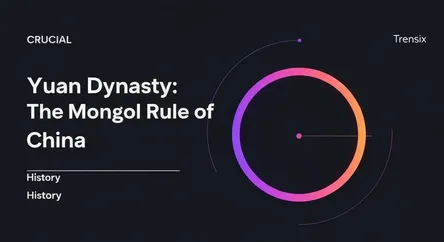History
Yuan Dynasty: The Mongol Rule of China

Discover the Yuan Dynasty, the Mongol-led empire founded by Kublai Khan that unified China and fostered immense cultural and economic exchange.
What is it?
The Yuan Dynasty (1271–1368) was a Mongol-led imperial dynasty of China founded by Kublai Khan, the grandson of Genghis Khan. It was the first time that the whole of China was ruled by a non-Han ethnicity, making it a unique and transformative period in Chinese history. The dynasty was established after the Mongols completed their conquest of the Southern Song dynasty in 1279, unifying China after more than 300 years of fragmentation. Kublai Khan adopted Chinese-style administration, establishing his capital at Dadu (modern-day Beijing).
Why is it trending?
The Yuan Dynasty remains a topic of historical interest due to its significant impact on global interaction. During this era, the Pax Mongolica (Mongol Peace) secured the Silk Road, leading to unprecedented levels of trade and cultural exchange between East and West. This period facilitated the travel of figures like Marco Polo, whose accounts introduced medieval Europe to China's wealth and innovations. The dynasty's cultural achievements, such as the development of the novel, vernacular literature, and the flourishing of blue-and-white porcelain, also continue to be studied and admired.
How does it affect people?
The Yuan Dynasty's legacy influences modern China and the world. It unified the territory of China, and its administrative divisions became a model for the provincial system of later dynasties and modern China. The cultural and technological exchange during this period was immense; Middle Eastern cartography, astronomy, and medicine were introduced to China, while Chinese inventions like gunpowder and printing spread westward. This era of globalization fostered a blend of cultures that enriched both China and the wider world, demonstrating the profound effects of cross-continental trade and communication.